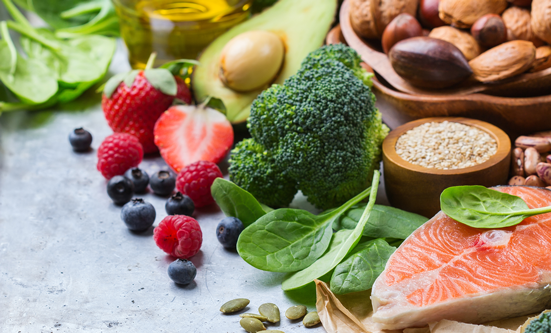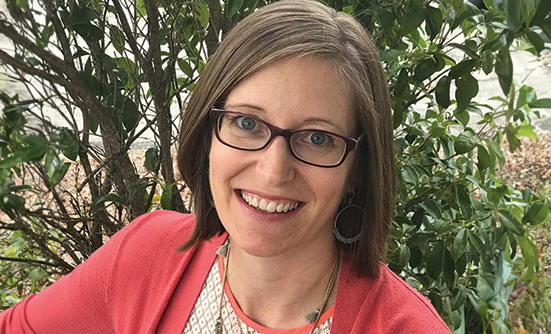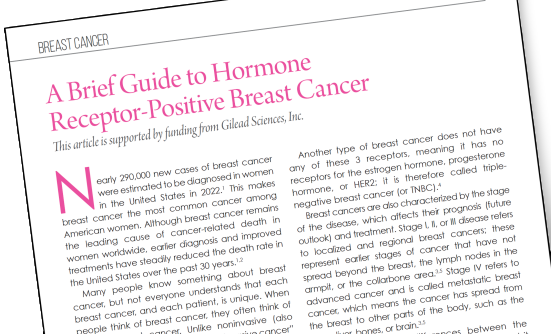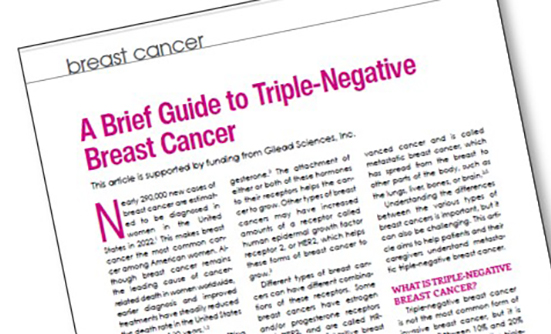With more than 3.1 million breast cancer survivors in the United States and the renewed interest in nutrition, health, and well-being, it is not surprising that the Internet is ablaze with information about how to prevent breast cancer, or what to eat after a diagnosis. With all this information, it can get confusing about who to believe and which diet to follow. But it doesn’t have to be so hard! Simply making a few lifestyle changes can provide significant benefits for breast cancer prevention and survivorship.
MAINTAIN A HEALTHY WEIGHT
Why Should We Worry About Weight?
Maintaining a healthy weight is important for your overall health and for breast cancer recurrence. Research has shown that significant weight loss or weight gain during breast cancer treatment can negatively affect your outcome. Weight gain is common in women with breast cancer for several reasons, including decreased physical activity, changes in eating habits, and the effects of the treatment, such as hormonal changes causing early menopause.
Obesity—which is classified as body mass index (BMI) >30—after a breast cancer diagnosis has been linked to earlier death from cancer or from other causes, and has been shown to increase the risk for cancer recurrence. A weight loss of just 5% to 10% can significantly reduce this risk!
How Do We Achieve a Healthy Weight?
- Start small—having a large amount of weight to lose can be overwhelming. Starting with a modest weight-loss goal can still provide health benefits, and will help keep you from getting discouraged
- 1 to 2 pounds/week of weight loss is optimal and safe, even during treatment
- 1 pound = 3500 calories (eat 500 calories less than you burn in a day for a weight loss of 1 pound/week)
- Key points for healthy weight control:
- Regular moderate exercise: 30-60 minutes/day of moderate activity, such as brisk walking or swimming
- Healthy eating: plant-based diet, not skipping meals, balanced meals/snacks, avoiding sugary snack foods and drinks
- Mindful eating: becoming aware of your eating habits, and paying attention to what goes into your body
CONSUME A PLANT-BASED DIET
Why a Plant-Based Diet?
Studies of women with breast cancer have shown benefits of eating a plant-based diet during treatment and as a part of daily life for survivorship. One study showed that women with breast cancer who consumed diets high in fruits, vegetables, and whole grains compared with women consuming a typical Western diet (high in red and processed meats, saturated fats, and refined grains) had a 60% reduced risk for death from any cause, and an 88% reduced risk for death from breast cancer.
Plant foods are rich in vitamins and minerals and contain phytochemicals. These natural plant chemicals give plants their color and smell, and help to fight cancer and promote health in many different ways (see below).
Plant foods are also rich in fiber, and eating large amounts of fiber reduces the risk for dying from any cause!
A plant-based diet is also helpful for maintaining a healthy weight. Fruits and vegetables are full of water and fiber, and have only 33% of the calories in other foods! Filling your plate (and filling up) with these foods allows you to feel satisfied with only a fraction of the calories.
How Do We Consume a Plant-Based Diet?
- According to the American Institute for Cancer Research, 66% or more of our food should come from plant sources and 33% or less from healthy animal proteins
- Plant-based foods include fruits, vegetables, whole grains, nuts, seeds, beans, and legumes
- Aim for 5 to 10 servings of fruits and vegetables daily
- Make a rainbow of colors on your plate to maximize your phytonutrient benefits
CHOOSE HEALTHY FATS IN MODERATION
Why Focus on Fats?
Dietary fat has long been associated with breast cancer (Table). It was previously believed that higher total fat intake was associated with an increased risk for breast cancer. Newer evidence indicates that the type of fat may be more important, especially for certain cancer types.
Consuming high amounts of saturated fats was linked to a 28% increased risk for estrogen receptor–positive breast cancer. However, some studies have shown a decreased risk for breast cancer with consumption of the “healthier” fats, including monounsaturated and omega-3 fats.
A recent study of breast cancer survivors found a decreased risk for cancer recurrence in women consuming a 20% fat diet (meaning that 20% of the women’s total calories came from fat), but only in those with estrogen receptor-negative tumors.
How Do We Consume Healthy Fat in Moderation?
- A good rule of thumb is that 20% of your total calories should come from fat
- Your focus should be on choosing the right fats
- Don’t forget that even healthy fats are high in calories (1 tablespoon = 120 calories), so use moderate amounts!
Patient Resources
Mayo Clinic
www.mayoclinic.org/healthy-lifestyle/womens-health/in-depth/breast-cancer-prevention/art-20044676
National Cancer Institute
www.cancer.gov/types/breast/patient/breast-prevention-pdq
Johns Hopkins Medicine
www.hopkinsmedicine.org/breast_center/treatments_services/nutrition.html












